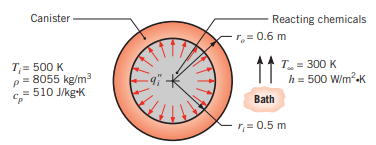A spherical, stainless steel (AISI 302) canister is used to store reacting chemicals that provide for a uniform heat flux qi'' to its inner surface. The canister is suddenly submerged in a liquid bath of temperature Tambient < Ti, where Ti is the initial temperature of the canister wall. (a) Assuming negligible temperature gradients in the canister wall and a constant heat flux qi'', develop an equation that governs the variation of the wall temperature with time during the transient process. What is the initial rate of change of the wall temperature if qi'' = 105 W/m^2? (b) What is the steady-state temperature of the wall? (c) Determine the wall temperature as a function of time.
A spherical, stainless steel (AISI 302) canister is used to store reacting chemicals that provide for a uniform heat flux qi'' to its inner surface. The canister is suddenly submerged in a liquid bath of temperature Tambient < Ti, where Ti is the initial temperature of the canister wall.
(a) Assuming negligible temperature gradients in the canister wall and a constant heat flux qi'', develop an equation that governs the variation of the wall temperature with time during the transient process. What is the initial rate of change of the wall temperature if qi'' = 105 W/m^2?
(b) What is the steady-state temperature of the wall?
(c) Determine the wall temperature as a function of time.

Trending now
This is a popular solution!
Step by step
Solved in 4 steps with 22 images


